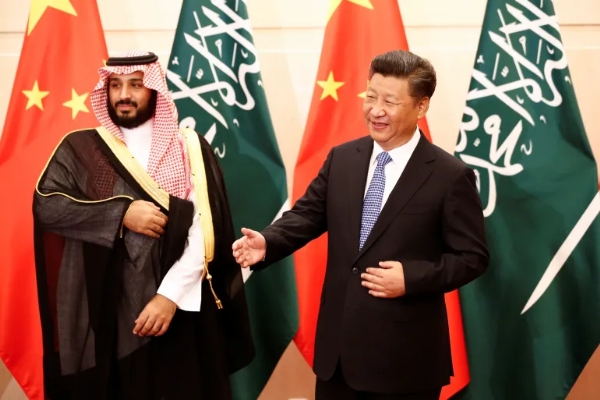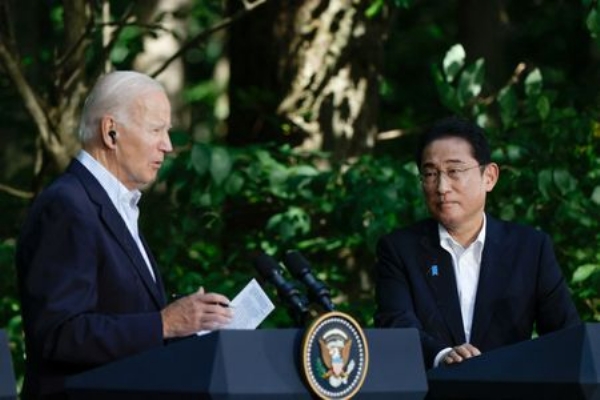#SecurityScan 80: Attack in Pakistan's Gwadar, Cyberattacks undermining democracy & more
A militant attack near the southwestern Pakistani port of Gwadar has reignited security concerns surrounding China"s Belt and Road projects in the country, challenging the new government in Islamabad
Total Views |
This article is a summary of important events that have taken place in last one week affecting, India's national security
#COUNTERING CHINESE MULTI DOMAIN , GREYZONE, HIGH BREED WARFARE
US ‘may be sending strong message’ to China with hypersonic missile test as arms race heats up
US Air Force says its final test of AGM-183A Air-launched Rapid Response Weapon on Sunday ‘intended to further a range of hypersonic programmes’

US and China expected to continue developing hypersonic weapons while also improving their defensive capabilities to neutralise these systems.
China's Indian land grab has become a strategic disaster, Xi Jinping faces dilemma in resolving crisis without losing face
The military standoff along the long Himalayan frontier between China and India may not be grabbing international headlines these days given the open warfare raging elsewhere in the world, but the threat of the confrontation returning to armed conflict cannot be discounted.
Last week, Indian Foreign Minister S. Jaishankar called the Chinese border situation "very tense and dangerous." Both sides have been significantly ramping up deployments of troops and weapons, girding for the possibility of war.
Soon to enter its fifth year, the current standoff was triggered by furtive Chinese encroachments into India's northernmost territory of Ladakh in April 2020, just before thawing ice would normally reopen Himalayan access routes after the brutal winter.
Ahead of this year's spring thaw and possible new Chinese provocations, India moved an additional 10,000 troops to the frontier.
China has also been expanding its troop presence and frenetically building warfare-related infrastructure along the inhospitable frontier. This has included boring tunnels and shafts in mountainsides to set up command positions, reinforced troop shelters and weapons-storage facilities.
In addition, it has planted settlers in new militarized border villages that are becoming the equivalent of the artificial islands it created in the South China Sea to serve as forward military bases.
About 100,000 troops remain locked in a faceoff along the border's westernmost Ladakh sector. Another key sector is the vulnerable area where the borders of Tibet, Bhutan and India's Sikkim state meet, a 22-kilometer-wide corridor known as "the chicken neck" due to the crooked way it connects India's northeast to the country's heartland.
The corridor's vulnerability has been increased by Chinese encroachments on Bhutan's southwest borderlands, with the chicken neck now potentially within striking distance of China's long-range conventional weapons.
There are also troop faceoffs in the eastern Himalayas along Tibet's long border with India's Arunachal Pradesh state. This has long been a heavily militarized area, largely because China claims the Indian state is part of Tibet.
Modi visits Bhutan to shore up India's position amid Chinese outreach
Thimphu keeping New Delhi 'in the loop' on boundary talks with Beijing,
Indian Prime Minister Narendra Modi arrived in Bhutan, visiting to shore up ties with the Himalayan neighbour as rival China works to increase its influence there.
The trip, likely Modi's last foreign journey before he seeks a third term in India's weeklong general election starting April 19, comes about a week after he hosted the new Bhutanese prime minister, Tshering Tobgay, in New Delhi.
Attack in Pakistan's Gwadar strikes near heart of China's interests
Challenge of securing Belt and Road projects resurfaces for new Sharif government
A militant attack near the southwestern Pakistani port of Gwadar has reignited security concerns surrounding China's Belt and Road projects in the country, challenging the new government in Islamabad and undermining assurances to Beijing.
Eight militants stormed the Gwadar Port Authority complex on Wednesday, 7 kilometers from the port itself and operated by China Overseas Ports Holding as part of the China-Pakistan Economic Corridor (CPEC). They crashed a car full of explosives into the gate of the complex, but it did not fully detonate. As many as five security personnel were killed, along with all eight attackers.
The South China Sea could boil over, America’s refusal to rein in China's aggressive expansionism may make a clash more likely
With the wars in Ukraine and Gaza stretching its military resources thin, a direct confrontation with China is the last thing the U.S. needs.
Already, the U.S. has allowed China to gain such a strong footing in the South China Sea that restoring the status quo of just a decade ago would be all but impossible without a full-scale war. And, as the recent increase in provocations in the South China Sea indicate, Xi is bolder than ever, despite the rising risk of escalation, accidental or otherwise. In the meantime, America’s failure to rein in China’s aggressive expansionism is undermining its own security and trade. interests.
Will China Push the U.S. Dollar Out of the Middle East?

For Gulf states, balancing the use of the dollar and the renminbi will become a way of maintaining strategic neutrality amid global geopolitical fragmentation.
The Limits of China’s Economic Influence
Economic interdependence in the Asia-Pacific and beyond has facilitated China’s use of economic statecraft – the manipulation of trade or investment ties for political purposes. Beijing has become more active at using both coercion and inducements in attempts to shape the actions of governments as well as companies.
While China’s economic statecraft has altered the strategic calculations for many countries and could have far-reaching implications for the trajectory of great power competition, Chinese influence is not a foregone conclusion. Beijing has encountered considerable pushback and often shot itself in the foot, suggesting that the world need not be overly concerned about undue influence. At the same time, the diffuse lure of economic interdependence remains a powerful draw, and one that is hard for Washington to tackle head-on without offering alternative or complementary economic opportunities.
China has met with some successes but also many failures in its attempts at economic influence. Subversive carrot tactics have allowed China to make inroads in places where leaders can act with relative impunity, such as Cambodia, but have backfired in countries where leaders face accountability mechanisms. While seemingly an easy and cheap approach to get immediate payoffs, under-the-table carrots spark public dissatisfaction and elite contestation, with Beijing and Chinese-financed projects often getting entangled in political scandals and election campaign rhetoric.
China’s Economic Collision Course, As Growth Slows, Beijing’s Moves are Drawing a Global Backlash
China’s trade imbalances are not sustainable for the rest of the world, and China should not be surprised if foreign governments start to respond more aggressively. Beijing is likely to reject measures similar to those the United States and its partners adopted in the 1980s to address Japan’s trade imbalances, such as an exchange rate arrangement resembling the Plaza Accords or Louvre Accords.
Tariff hikes on Chinese imports, another policy available to foreign governments, may only provide temporary relief; when the Trump administration imposed such levies, many Chinese suppliers were able to skirt these regulations by shipping goods through third countries before they reached their final destinations in the United States. With few effective policy options and an unwilling negotiator in Beijing, Western governments in particular will consider increasingly draconian restrictions on Chinese trade.
That shock may be what is necessary for China to take structural reforms seriously, for the sake of its own economic health and in the hope of avoiding an irreparable split in global trade.
China coast guard water-cannons Philippine ship days after US backs Manila in disputed sea

China’s coast guard used water cannon against Philippine boats in a contested area of the South China Sea on Saturday, the latest in a string of maritime clashes between the two countries.
The skirmish comes just days after US Secretary of State Antony Blinken reiterated Washington’s commitment to defending Philippine access to the vast waterway, which China claims sovereignty over, sparking increasing clashes with its neighbors in recent years.
Video of the incident showed a Philippine civilian vessel taking “heavy damage” from the water cannon, according to the Armed Forces of the Philippines.
Philippines summons China envoy over stand-off, dares Beijing to seek arbitration
The Philippines summoned China’s envoy on March 25 to protest against “aggressive actions” in the South China Sea at the weekend, as Manila’s Defence Minister dared Beijing to bolster its vast sovereignty claims by taking them to international arbitration.
The Foreign Ministry accused China’s coast guard of using water cannon against a civilian boat supplying troops on March 24 at the Second Thomas Shoal, which it said damaged the boat and injured some crew members, the latest in a series of flare-ups in the past year.
“China’s continued interference with the Philippines’ routine and lawful activities in its own exclusive economic zone (EEZ) is unacceptable.
China set to be declared a threat to national security
Britain and US expose scale of cyberattacks designed to undermine democracy and repress critics
Britain and the United States have accused China of launching a “prolific” global campaign of cyberattacks targeting the personal information of politicians, journalists, academics and millions of voters.
In an unprecedented joint operation to expose Chinese espionage, London and Washington revealed details of a decade-long campaign by Beijing to “repress critics, compromise government institutions, and steal trade secrets”.
In the UK ministers revealed that China had successfully gained access to a “treasure trove” of personal information in a cyberattack on Britain’s election watchdog and had attempted to spy on MPs critical of Beijing.
US authorities disclosed that a small group of Chinese hackers, known as Advanced Persistent Threat 31 (APT31), had compromised the emails, cloud storage and telephone call records of millions of Americans.
Britain was hoodwinked by all-seeing China
After compromising our national security in pursuit of economic opportunity, it’s time to unwind this relationship
At what point, do you think, will our diplomats and bean counters realise they have been honey-trapped? At least in terms of the UK’s political economy. For years, they have sold us the story of China as the great opportunity for Britain.
First, Beijing was the miraculous source of ultra-cheap technology to help us to cut costs. Then it became a fount of essentially free money to fund mega-investments. And then we were told the Chinese market was the great hope for high-value British service exports on a vast scale, despite the numerous barriers. Only now are we starting to count the cost of these illusions.
US and Japan plan biggest upgrade to security pact in more than 60 years
Biden and Kishida to announce move to counter China at White House meeting next month.

Xi Slams Technological Barriers During Dutch Premier’s Visit, US is pushing for tighter controls on sales by ASML to China, Xi warns barriers ‘only lead to division and confrontation’
Chinese President Xi Jinping criticized “technological barriers” during Dutch Prime Minister Mark Rutte’s visit to Beijing as the US pushes to tighten controls on ASML Holding NV’s chip making-equipment sales to the Asian country.
“Artificially creating technological barriers and cutting off industrial and supply chains will only lead to division and confrontation,” Xi said, according to state broadcaster CCTV. “The Chinese people also have the right to legitimate development, and no forces can hinder the pace of China’s technological progress.”
Biden Counters China by Partnering Japan and the Philippines
When the two nations’ leaders visit Washington in April, they will cement a loose military partnership in the Western Pacific.
One of President Joe Biden’s top achievements has been his coalition-building prowess in the Indo-Pacific. The US has strengthened and stitched together various relationships — bilateral, trilateral, multilateral — to defend against an increasingly bellicose China. Biden seems set to notch another win next month, when he hosts the leaders of Japan and the Philippines in Washington to seal a new trilateral partnership.
Now he just needs a defense budget that is remotely equal to his ambitious diplomacy.
Indian Energy Security- Anil Kakodkar: Nuclear Power Should be Scaled Up
The loading of fuel into the 500MW Prototype Fast Breeder Reactor at Kalpakkam recently is a signal moment, says Dr Anil Kakodkar, former chairman of India’s Atomic Energy Commission. He said it came on the back of over 20 years of effort by Indian atomic scientists. It will generate more plutonium that it consumes, thereby ensuring fuel for future reactors and reducing the issues relating to storage and treatment of nuclear waste.
But Dr Kakodkar believes nuclear energy does not have the same level of support that perhaps other energy sources, such as renewables, have had. Can't the government encourage bonds similar to the Green Bonds for renewable energy, he asked.
In his view, India needs to ramp up its programme of building nuclear reactors: currently two of 1000 MW each are under construction in Kudankulam, Tamil Nadu. Ideally, this should be scaled up to perhaps six such reactors. Then only will India make a dent in the electricity deficit.
He said India today has the technology and the industrial capacity to build reactors “in fleet mode”, which is what the government wants. Industry needs to be reassured they will be sustained, then only will they seek to invest in capacity and technology. He also called for more companies like the Nuclear Power Corporation of India to speed up reactor construction.
WORLD AT WAR
Moscow shooting poses awkward questions for Russia's intelligence agencies
Security services appear to have been caught off guard. The Kremlin says no country is immune from terrorism. Ex-spies say Russia is too busy with Ukraine/internal dissent. Warning signs appear to have been missed.
Russia has been ruthlessly effective at detaining Vladimir Putin's opponents but was caught off guard by a mass shooting near Moscow, raising questions about its priorities, resources and intelligence gathering.
Charged with hunting down Ukrainian saboteurs inside Russia, with keeping anti-Kremlin activists in check, and with disrupting the operations of hostile foreign intelligence agencies, the FSB, the main successor agency to the Soviet-era KGB, has its hands full.
Robots Are entering the Ukraine Battlefield

Kyiv deployed drones to deadly effect in the air and at sea, but plans to repeat the strategy on the ground face challenges
In August, a Ukrainian assault team steered an armored vehicle silently for 2.5 miles before firing 300 bullets at a group of startled Russian soldiers.
The vehicle had no driver or gunner, and was instead a land drone, an early example of the robot-like vehicles that Ukraine is increasingly using to hit enemy forces, clear and lay landmines and rescue injured soldiers.
EU Seeks to End Russian Grain Imports With Steep Tariffs
New duties seek to appease European farmers and curb Russian revenues as war in Ukraine drags on
In a big shift, the European Union is planning to impose tariffs on Russian grain, part of an effort to curb Moscow’s export revenue and appease European farmers who are angry about imports of cheaper agricultural products.
The plan—the bloc’s first push to restrict food products from Russia during the war—comes amid protests over Ukrainian agricultural imports by farmers who have at times set up blockades at border crossings. The tariffs will apply to EU imports of cereals, oilseeds and derived products from Russia and its ally Belarus.
Bolstering Ukraine's Irregular War Against Russia
As Ukrainian forces assume a more defensive posture, Kyiv's irregular warfare behind enemy lines becomes even more important. Ukrainian irregulars are already active, even striking distant targets in Russia. With Western support and technology, these silent warriors could become even more potent.
‘A Ticking Time Bomb’: In Syrian Camps, Fears of an Islamic State Revival
The U.S. and its allies are struggling to repatriate civilians and militants as security risks grow
A recent security sweep inside a sprawling fenced refugee camp holding 44,000 people turned up a raft of weapons, dozens of Islamic State militants and a Yazidi woman who had been held by the group for nearly 10 years.
For many, the horrors of Islamic State ended when a U.S.-led military campaign collapsed the group’s self-styled caliphate in 2019. But five years later, tens of thousands of civilians are still being kept in camps including in Al-Hol, which are filled with the families of Islamic State militants and others inadvertently swept up in the chaos of northeast Syria.
Drugs, Internet crime, Gangs netting up to $3 trillion a year as Southeast Asia human trafficking becomes a global crisis, Interpol says
Human trafficking-fueled fraud is exploding in Southeast Asia with organized crime rings raking in close to $3 trillion in illicit revenue annually, the head of Interpol has said in comments that reveal the huge profits being earned by cartels.

One international organized crime group makes $50 billion a year, according to Interpol secretary-general Jurgen Stock, adding that $2 trillion to $3 trillion of illicit money flows through the global financial system annually. To compare, France’s economy is worth $3.1 trillion according to the International Monetary Fund.
While drug trafficking contributes around 40% to 70% of organized crime income, criminal groups are also using those smuggling networks to illegally move humans, arms and stolen products among other things, Stock said.
“Driven by online anonymity, inspired by new business models and accelerated by Covid, these organized crime groups are now working at a scale that was unimaginable a decade ago,” Stock told a briefing at the global police coordination body’s Singapore office on Wednesday.
“Today, a bank – or indeed anyone – is less likely to be robbed at gunpoint than via a keyboard by someone on the other side of the world.
“What began as a regional crime threat in Southeast Asia has become a global human trafficking crisis, with millions of victims, both in the cyber scam centers and as targets.”
Chinese views By Global Times
Jaishankar's remarks over China's Zangnan disregard common sense, a vicious attempt to win votes, say Global Times
The claims made by India's External Affairs Minister S Jaishankar over the Chinese territory of Zangnan in Singapore on Saturday were slammed by Chinese analysts on Sunday as a brutal disregard of historic common sense, and the recent acts and remarks by the Indian government are viewed as merely a vicious attempt to help Prime Minister Narendra Modi and his party to win re election, by establishing a hawkish image to court domestic nationalist voters.
India is naive to interfere in South China Sea issue By Global Times
India thinks it has seized a "golden opportunity" to contain China by meddling in the South China Sea issue, but it is just being very naive.
India is not party directly involved in the South China Sea issue, and their attempts to get involved are driven by external forces like the US and the pursuit of self-interests, said Chinese experts, who also warned that their intervention will only exacerbate the divisions and conflict in the region, after the foreign ministers of the two countries recently expressed so-called grave concerns on the issue.
The upgrading and transformation of the US-Japan alliance unleashes a dangerous force: Global Times editorial
If the dangerous force within Japan is "unleashed," it will threaten the peace and stability of the Asia-Pacific region, but ultimately the biggest harm will still be to Japan itself.
China, India hold 'candid, in-depth' talks on boundary issues but Jaishankar says 'won't compromise'
As China and India agreed to continue talks through diplomatic and military channels to resolve border issues at the latest border consultation in Beijing, India's External Affairs Minister S Jaishankar said he will "never compromise on securing borders," a move analysts viewed as a trick to pass the buck to China over the dispute and try to gain more leverage to bargain with Beijing.
--


